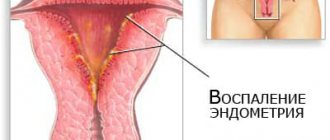The female body is a complex and at the same time unique system, which is largely subordinated to the reproductive function of the body. The health and well-being of a woman depends on the condition and harmonious interaction of the reproductive organs. Every month there is a natural process of maturation of eggs in the ovaries and preparation for their consolidation in the uterus after meeting the sperm. If fertilization does not occur, then the inner layer of the uterus is rejected, since during this period there is no need for it and menstrual bleeding occurs, the so-called “menstruation” in everyday life. They appear monthly, after the same period of time, the specific timing depends on the duration of the cycle, which can last from twenty-five to thirty days. This is the norm; anything that has deviations indicates possible violations. Most often, women experience the fact that they get their periods for the second time during one cycle. Naturally, this is alarming and requires immediate clarification of the cause of such a violation, as well as appropriate treatment.
Causes of menstrual irregularities
Before looking for the answer to the question: “Why do menstruation occur 2 times a month,” we note that although this violation is not the norm, it is still not always a symptom of pathology; sometimes failures occur under the influence of external and internal factors, which are quite simple adjust.
And so, let’s outline the main points that affect a woman’s menstrual cycle.
First of all, it is worth highlighting emotional stress and stressful situations. As a rule, the body reacts to them in the next cycle and then menstruation may occur twice or be absent altogether. In addition, the reason may be:
- chronic fatigue;
- constant lack of sleep;
- overwork.
The physiology of impaired menstruation is that under the influence of these factors, a hormonal surge occurs in the body, which leads to the appearance of “unscheduled” bleeding, which we call menstruation, although it has nothing to do with it. In medicine they are called menstrual-like bleeding.
Poor nutrition can also affect your cycle. We are especially talking about strict mono-diets, low in fat and carbohydrates. With their deficiency, the female body begins to accelerate the rejection of the endometrium and, as a result, bleeding appears. Correcting the situation will not be difficult; you need to switch to a rational, balanced diet and reconsider your lifestyle.
Another common reason that can cause menstruation to appear a second time is taking pills and using contraceptives. It should be noted that many oral contraceptives have side effects in the form of spotting, which women confuse with scanty menstruation. As a rule, a couple of months after starting to take the drug, hormonal levels are restored and the cycle returns to normal. However, if the amount of discharge is large enough and they are accompanied by a number of unpleasant symptoms, then there is no point in waiting; you should immediately consult a doctor.
The intrauterine device also affects the nature of the cycle. In some women it may not cause heavy bleeding, in which case it should be removed immediately.
Excessive physical stress on the muscles of the legs, perineum and abdominal cavity also poses a danger to the female body. Exercises with a barbell, squats, and abs can lead to the release of blood into the abdominal cavity and the appearance of bleeding.
In addition, those representatives of the fair sex who:
- have just entered puberty and their cycle is just beginning to establish itself;
- are of advanced age, they are characterized by entering the period of menopause, during which it is quite possible to bleed twice a month.
Pregnancy, or rather certain stages of it, can also be accompanied by bleeding. As a rule, they occur during the attachment of a fertilized egg to the uterine mucosa.
All of the above reasons do not cause concern for a woman’s health and can be quickly eliminated.
But, there are cases when bleeding is a symptom of pathological changes and requires immediate qualified help.
Provoking factors
Frequent periods are not always a sign of pathology; there are situations when their occurrence is provoked by additional factors:
- stressful situations. Stress can affect the regularity of the menstrual cycle, but usually after normalization of the psycho-emotional state, critical days continue to run as usual. Hormonal “swings” can be provoked not only by emotional stress, but also by chronic fatigue, sleep problems, and overwork. Even an infection in the acute stage can cause stress in a woman. If the cause of menstrual-like bleeding is psycho-emotional problems, it is possible that in addition to consulting a gynecologist, a psychotherapeutic session will be required;
- poor nutrition. An unbalanced diet filled with harmful foods and drinks can provoke changes in hormonal levels and, as a result, the onset of frequent regulation. Strict diets, irregular nutrition, large amounts of alcohol, fatty, spicy and synthetic foods (lemonade, chips, snacks) lead to the fact that the female body begins to intensively reject the endometrium, causing additional blood loss. For the normal functioning of the reproductive system, you should enrich your diet with healthy foods and also drink vitamins;
- exercise stress. When a woman plays sports with weights, intra-abdominal pressure increases, which causes tension in the muscles of the perineum and the release of blood, similar to the second period. To prevent the development of serious diseases of the reproductive system, when training with a barbell, during abdominal exercises or when doing squats, the load should be increased gradually and exercised under the supervision of a trainer. And during menstruation, it is generally better to give up intense sports for 2-3 days;
- pregnancy. After fertilization, the egg attaches to the inner layer of the uterus; this process may be accompanied by damage to small blood vessels. Although the amount of blood from these capillaries is very small, in some cases women may confuse them with menstruation that began again in the same cycle.
The influence of gynecological diseases on the cycle
Various female ailments and pathological conditions can cause menstruation twice a month. Let's note the main ones:
- tumors in the reproductive organ of an oncological nature, they cause repeated bleeding, which are watery in nature;
- miscarriage is always accompanied by bleeding, including in the early stages of pregnancy, so a woman does not know about pregnancy and may mistake it for menstruation;
- endometriosis, polyps, fibroids, erosions, etc.;
- poor blood clotting;
- ectopic pregnancy.
You can suspect repeated periods caused by a pathological process in the body based on a number of symptoms that accompany them.
This is first of all:
- abundant discharge or, conversely, scanty;
- presence of blood clots;
- pelvic pain;
- weakness;
- fever;
- changes in the color of the discharge, they can be yellow, yellow-green;
- watery character.
If a woman notices the indicated symptoms, she should immediately seek help from a specialist to undergo a diagnostic examination and further treatment.
Which occur twice in one cycle, can appear for various reasons and indicate some problems of the reproductive system.
When is the menstrual cycle considered normal?
The duration is special for each woman, since no two organisms are identical. But there are still some norms and frameworks by which the normal state of internal organs and their work is determined.
A normal cycle ranges from 21 to 35 days.
If the break between cycles is short, then menstruation may begin at the beginning and end of the month, but this is within normal limits. If the delay is longer than this period, then this indicates either the onset or presence of malignant tumors or diseases. The appearance of characteristic bleeding ahead of schedule, that is, if menstruation occurs for the second time in a month after the first, this is also a signal from the body about problems. Only a doctor can determine what to do, but there are several reasons for such a violation.
Did you know?
A healthy uterus at rest usually measures 7-8 centimeters in length and about 5 centimeters in width. And with the onset of pregnancy, amazing changes occur to it: before it begins to reach the navel, and at 36 weeks its edge reaches the chest.
Causes of deviations that are not considered pathology
Of course, such a violation is bound to cause concern or concern. But there are many reasons that affect the body and can lead to a similar condition. It is impossible to exclude the influence of both external factors affecting the body and internal changes, which, however, are not pathological. Here is a list of possible reasons that affect a woman or girl and can provoke repeated periods:
- Quite often, teenagers get periods twice a month. The reason is that hormones at this age are very unstable, which causes schedule disruptions.
- Hormonal imbalance. This type of problem causes instability and chaos in the cycle. Such a disorder may occur due to inflammation of internal organs.
- Often, due to a miscarriage, the duration of the break can be disrupted and lead to such shifts. It may also be due to hormonal imbalance after the loss of a child.
- may cause this side effect, especially during the first months of use.
- It is also not a pathological feature of the body that menstruation 2 times in one calendar month, that is, at the beginning and at the end of the month, can appear for the reason that the girl simply has a short period between cycles. Often appears in those for whom it is 21-26 days.
- For women preparing for pregnancy, such a failure may indicate its imminent onset.
- Minor discharge with blood may appear during ovulation or fertilization and the implantation of the egg into the walls of the uterus.
- sometimes it causes not only a disruption in the schedule, but also constant heavy bleeding. In this case, it is very important to contact a gynecologist and use a different method of contraception. The spiral needs to be removed.
Important!
Very often, representatives of the fairer sex experience bleeding while on vacation.
There is no need to worry about this, as this is due to changes in climate or time zone. This usually only occurs once and does not happen again. There are many different reasons that cause such a malfunction in the reproductive system. If menstruation occurs twice a month, then this may even be due to strong negative emotions that are reflected in the body. Do not immediately think that this is the influence of the disease.
Pathologies
If menstruation appears twice per cycle, and none of the above reasons occur, this means that there are pathological processes or inflammatory diseases in the body. In such a situation, you must immediately consult a doctor for an accurate diagnosis and appropriate treatment. Let's look at the most common women's health problems that cause bleeding and frequent menstruation.
Inflammation
If there is inflammation in a woman’s body, then it may seem to her that her period has come for the second time in a month, although most often these pathological processes are accompanied by internal bleeding. You should pay attention to additional symptoms. If the discharge smells unpleasantly of rot or rotten meat, there is severe pain in the lower abdomen and elevated body temperature, in most cases inflammation in the pelvic organs is diagnosed.
Erosion
Inside the cavity and cervix there is a layer of epithelial cells. In the uterus, these cells have a more rounded shape, and the cervix is lined with a dense layer of columnar epithelium. Erosion refers to small ulcers on the mucous membrane of the cervix, the appearance of which can be caused by gynecological diseases, sexually transmitted diseases, hormonal disorders, as well as mechanical damage to the mucous membrane.
Most often, erosion is asymptomatic; it is not characterized by menstrual irregularities, so if your period starts a week or two after the usual regular periods and the doctor diagnoses the presence of cervical erosion, then most likely the bleeding came out of the damaged mucosa. To relieve inflammation, ointments, suppositories and douching are used, and the affected layer of epithelium is removed by surgical methods.
Endometriosis
With endometriosis, pathological growth of the inner epithelial layer of the uterus occurs. With this disease, menstruation may occur several times a month, accompanied by nagging pain in the lower abdomen and lower back. Treatment includes hormonal therapy and surgical interventions.
Uterine fibroids
The cause of menstruation, which occurs 2 times a month, may well be fibroids. Although this is a benign formation, it is characterized by growth to incredible sizes. One of the stages of its development may be a hormonal imbalance, which ultimately causes uterine bleeding in the middle of the cycle. Myoma is quite dangerous; for small tumors, observational tactics are chosen, and large specimens are treated with medication and surgery.
Endometrial hyperplasia
This disease is also called adenomyosis. It is characterized by the growth of the endometrium outside the uterus, usually epithelial cells grow into the fallopian tubes, ovaries, digestive, respiratory or urinary systems. Cell spread occurs through lymph, blood or direct contact. This is one of the common causes of frequent periods; in addition, a symptom of the disease is too much discharge, which can lead to iron deficiency anemia. Women suffering from constant miscarriages and infertility are often diagnosed with this disease.
Polyps
Frequent periods can be caused by focal growth of the endometrium or so-called polyps. This disease is also characterized by prolonged menstruation with nagging pain in the lower abdomen and lower back.
Miscarriage
If menstruation occurs every 2 weeks, this may indicate that a spontaneous abortion has begun. In this situation, the egg was fertilized, but could not attach normally to the inner wall of the uterus, so the body gave the command to get rid of the zygote. Such discharge can occur on any day of the cycle, and the woman may not even suspect that she is pregnant.
Ectopic pregnancy
If the fetus begins to develop outside the uterus, in the fallopian tube, they speak of the development of an ectopic pregnancy. This is a very dangerous situation not only for the health, but also for the life of a woman. One of the main symptoms of ectopic fetal development is bleeding that is not associated with the menstrual cycle, but visually resembles regula. Treatment is carried out exclusively by surgery.
Malignant tumors
If 2 weeks after the previous menstruation new bleeding occurs, and in the intervals between them a clear liquid with ichor is released, a malignant neoplasm can be diagnosed. To confirm the diagnosis, a complete examination is necessary.
Bleeding disorder
If you have frequent periods, this may be a sign of problems with blood clotting. They are caused by liver disease, hereditary hemophilia or lack of iron in the blood. Only laboratory tests can detect problems with blood clotting.
Pathologies that cause bleeding from the uterus
Sometimes failure of the normal functioning of the genital organs can occur as a result of the influence of more serious disorders, diseases or infections. Here are the main pathological reasons that provoke cycle failure:
Important!
Extraordinary bleeding
is
not menstruation, but only menstrual-like bleeding.
Its cause is most often a hormonal surge caused by stress, emotional turmoil, overwork or even lack of sleep. You should pay attention if they become the norm and appear constantly. Also, disorders can be caused by other diseases that the body has suffered. For example, bleeding after infections or severe colds is very common.
The meaning of emotional state
A woman’s emotions often become a source of problems - both for those around her and for herself. Bloody or spotting discharge is not always evidence of the onset of menstruation.
Such troubles may well be caused by instability of emotions.
Quite a lot of women have concerns about whether it is possible if their periods come 2 times in one month. Such a violation does not make it impossible to have children, but you must inform your doctor about this and undergo examinations, since the presence of other diseases and pathologies may interfere. Stress of different nature and duration always leaves an imprint on the functioning of not only the nervous system, but also the hormonal one. Large emotional or mental stress can cause disruptions and disruptions to the schedule. Even experiences leave an imprint on the functioning of the body, since health is actually a very fragile system. Active mental stress, poor sleep, non-compliance with the rest regime, worries and uncontrollable emotions can cause the appearance of discharge.
To eliminate this factor, it is best to:
- do not worry about everything and try to avoid shocks;
- keep all emotions under control, do not allow personal boundaries to be violated;
- monitor medications taken and their effects;
- take tests and undergo check-ups with a doctor;
- control hormonal levels.
Did you know?
The acidity level of the vagina is quite high, around 3 to 4, when the normal neutral pH is 7. This is equal to the acidity in beer or tomatoes. And all because of colonies of bacteria that are actively developing. Lactobacilli, which are part of the main group of the internal ecosystem, create a similar environment from their waste products. At the same time, it is she who protects the body and the uterus from the invasion of other microorganisms that move precisely to the places of colonization of the former.
In what cases should you consult a doctor if your menstrual frequency is irregular?
In fact, violations are caused by a large number of reasons. If a girl’s period begins 10 days after the previous one, this is due to the formation of the hormonal system in the body. This is normal, but still, in order to avoid more serious problems or to eliminate the possibility of developing diseases, it is better to consult a gynecologist.
If the bleeding is one-time, there is no need to worry. If it repeats regularly, occurs not only twice, but more often, more than 3 times, with a pause of several days, then you should definitely consult a doctor and get tested.
If menstruation appears for the second time in a month after, then the reason is a violation of hormone concentrations.
You should inform your doctor about this, as such a violation may become permanent. In case of such discharge of a different nature, which is accompanied by pain and discomfort, it is necessary to immediately contact a specialist, as this can be a symptom of not only serious gynecological diseases, but also abnormalities in the functioning of other internal organs, inflammation of the kidneys or bladder. Only a doctor can make an accurate diagnosis.
In the case when menstruation begins to come twice a month in women over 40 years old, there is only one reason - the onset of menopause. This is one of the fairly common signs of its approach.
Every girl and woman should remember that even rare but recurring discharge necessarily requires consultation with a doctor. Timely detection and proper treatment of problems will help to cope with diseases faster. And if the reason is that you get nervous too often, there is only one piece of advice - think about yourself and your health.
Many women experience menstrual irregularities, as a result of which menstruation may come twice in a month.
In youth, when the cycle is just forming, such phenomena, as a rule, do not indicate any disorders or diseases of the genital organs, but what can cause repeated periods in a mature woman who has not previously suffered from menstrual irregularities?
When to go to the doctor?
Regular visits to the gynecologist are the rule of life for any woman who takes care of her health.
But there are symptoms in the presence of which a doctor is needed in the near future:
- Repeated bleeding over several cycles.
- Bleeding more than 2 times a month.
- Profuse blood loss, with clots, unpleasant odor or impurities of mucus and pus.
- Severe pelvic pain, especially when combined with a violation of the general condition, fever.
- If there is no obvious connection with previous events or conditions: childbirth, severe stress, intrauterine device, etc.
The menstrual cycle is a reflection of a woman’s health. Even a qualified doctor cannot always answer why certain disorders occur, or menstruation occurs for the second time in a month. To find out the reasons, diagnostics are carried out.
The health of the female reproductive system can be judged by the duration and nature of menstrual flow. Normally, menstruation cannot come several times a month, because nature works in such a way that in the body of a healthy woman it takes almost a whole month for the egg to fully mature. If she was fertilized, then the woman becomes pregnant, if not, she will begin her period. What does it mean? But only that conception did not occur and the unused egg is released along with the inner layer of the uterus from the organ cavity.
Let’s try to figure it out in this article, what can it mean when new periods start 2 weeks after the previous period, what to do in such a situation, and whether this could be a variant of the norm. We will also consider the main reasons why menstruation occurs 2 times a month, what factors contribute to this, and in what situations it is necessary to seek help from a doctor.
Fine
The menstrual cycle is a normal physiological process for women of reproductive age. Its duration varies among women (from 21 to 35 days). Menstruation is bloody discharge that occurs under the influence of hormones. Typically, women have menstrual flow once a month, however, if a woman's menstrual cycle is only 21 days, then menstruation can occur at the beginning and end of the month.
If menstruation comes again in the middle of the cycle, this may indicate problems in the body and require treatment. Let's talk in more detail about the reasons for the appearance of menstruation twice a month.
Possible causes of repeated menstruation
In fact, there are quite a few reasons why your period may start for the second time in a month:
- Taking oral contraceptives. During the first three months of taking the pills, a similar reaction of the body is possible.
- Hormone imbalance. With hormonal disorders in the body, the cycle is chaotic and unstable. Such disorders can be caused by inflammation of the female reproductive system. Also, menstruation can occur twice a month after an abortion or after childbirth, as these processes can cause hormonal imbalance.
- Age characteristics. So, girls can experience repeated menstruation in the first 2 years after the start of menstruation, when the cycle is just forming; the same phenomenon is quite common among women in the premenopausal period.
- Processes associated with reproductive function. Scanty spotting in the middle of the cycle is sometimes observed in women during ovulation or during implantation of a fertilized egg.
- The intrauterine device can also cause repeated menstruation; if menstruation comes ahead of schedule and is very heavy, then it is necessary to find another means of contraception, and the IUD must be removed.
In addition to the above reasons, there are a number of pathologies
, in which menstruation can occur 2 times a month.
These include:
- Myoma is a benign tumor of the uterus that can be quite large. This tumor quite often causes hormonal imbalance and can provoke heavy and frequent menstruation. This pathology requires serious treatment, and sometimes surgical intervention.
- Adenomyosis is an inflammatory process caused by hormonal changes.
- Inflammation of the ovaries and fallopian tubes, erosion of the cervix can also cause sudden menstruation.
- Polyps and endometriosis are pathologies of the female genital organs that cause unscheduled menstruation.
- With uterine cancer, extraordinary discharge appears regardless of the menstrual cycle; as a rule, it is brownish in color and watery. If such discharge appears, you should immediately visit a doctor.
- Menstruation may occur in the middle of the cycle if the body rejects the fertilized egg and a miscarriage occurs.
- When a fertilized egg is implanted into the fallopian tube, spotting may also appear. An ectopic pregnancy is very dangerous, so it is very important to diagnose it on time. Read more about ectopic pregnancy.
- Also, cycle failure can occur in women who have problems with blood clotting.
In addition to the above reasons, unscheduled menstrual bleeding can be caused by stress of any nature.
. It is worth noting that extraordinary bleeding is not menstruation - it is menstrual-like bleeding. Various stressful situations often cause a hormonal surge, which leads to discharge.
As a rule, such situations are one-time in nature and do not recur in subsequent menstrual cycles. Stress is not always triggered by a strong emotional shock; overwork, infectious diseases, and lack of sleep can also cause stress.
Often, extraordinary menstruation occurs during vacation, this is explained by changes in climate and time zones.
When to seek help from a doctor
As can be seen from the above, there are quite a few reasons that can trigger menstruation twice a month. If a similar situation occurs in a girl at the beginning of the formation of the menstrual cycle, then this should not cause much concern, since it is a completely physiological process.
Also, do not worry too much if you are taking hormonal contraceptives, but it is necessary to report discharge to the doctor who prescribed the drug.
If menstrual-like bleeding in the middle of the cycle recurs more than once, you should consult a gynecologist and undergo the necessary examination. Only competent treatment will help cope with hormonal disorders and gynecological pathologies that provoke unscheduled menstruation.
The regular occurrence of menstruation indicates the proper functioning of the woman’s reproductive system. Irregularities in the menstrual cycle can mean pathological changes in the female body. It is not uncommon for women to encounter such a problem as the onset of menstruation 2 times a month. This deviation may be due to a number of reasons. Today’s article is about why periods occur 2 times a month, about the causes and consequences of this change.
Menstrual bleeding is a normal physiological process of the reproductive system of women of childbearing age. The ideal option for the menstrual cycle is the onset of menstruation in accordance with the lunar calendar. Such cyclicality indicates the trouble-free operation of all mechanisms of the genital organs. On average, the duration of the break between menstruation should be from 28 to 31-32 days.
What do we have to do?
In any case, even if you are sure that all this is due to a trip to the sea and a long flight, stress or refusal of hormonal pills, you should see a doctor. A simple examination can already rule out many problems, and an additional abdominal ultrasound or internal ultrasound will show that you are not pregnant (or pregnant), and everything is going as it should be, as well as the absence of internal pathologies in the uterus. In addition to an ultrasound, the doctor may also prescribe a test for hormones, as well as viruses and infections that can cause bleeding. A good specialist will immediately tell you how to restore the cycle and normalize the functioning of the reproductive system. In any case, it is highly not recommended to take any measures or self-medicate.
Many women have problems with menstrual cycle instability. It is believed that they indicate pathology of the pelvic organs, but this is not always the case. Gynecologists say that such cycle disorders are not at all a reason to sound the alarm, although you still need to visit a doctor.
We can say that in some cases, menstruation twice a month is normal and does not need to be treated. This problem is common among young girls whose menstruation is just beginning, and women at the age of menopause. For young girls, cycle disruption is also common, since in the first two years it will not be stable. If after this time the cycle is still not established, then you should take your health seriously.
Another reason for the repetition of menstruation during one cycle is a hormonal imbalance. Its violation occurs due to the use of oral contraceptives, ovulation, the presence of chronic diseases in the body or infection. Problems with hormones do not appear out of nowhere and do not disappear on their own; they require careful treatment and medical supervision.
Usually, menstruation, which occurs for the second time in a month, is not heavy, but is a thick discharge mixed with blood. An unstable menstrual cycle schedule can be considered normal only if such disturbances appear for no more than three months in a row. Otherwise, the situation is very serious, which requires qualified treatment.
Why do you have periods twice a month? The reasons are varied; a spiral may be a prerequisite for this phenomenon. But if you installed it and after that your cycle goes wrong, you will have to go to the doctor again, since this is not a normal situation. By identifying the problem early and starting treatment early, you can protect yourself from many more severe forms of disease and other problems. It is especially important for girls planning to have a child to monitor their women's health.
Another common reason for menstruating twice a month could be stress or overwork. You can’t even always tell when you’re too tired and your body has already reacted to an external stimulus. Also, the failure of the cycle can be affected by poor nutrition, constant lack of sleep, and incorrect rhythm of life. All these reasons can affect menstruation in women.
If menstruation twice a month is an isolated occurrence, and it lasts no more than three months, for example, after the prescription of contraceptives, then it is too early to worry. However, if such problems arise constantly or this happens over a long time, you need to go to a gynecologist. More serious causes of double menstruation include uterine fibroids, ovarian tumors, and problems with the thyroid gland.
Repeated menstruation does not always indicate problems with the female organs; sometimes they can occur due to thrombocytopathy. Too much leads to anemia and iron deficiency in the body.
Menstruation (menstruation, regula) is a regular process of rejection of the endometrium from the walls of the uterus. Menstruation for the second time in a month usually signals a pathology of the reproductive or hormonal system, although physiological reasons are possible. Bloody vaginal discharge is not always true menstruation. Uterine bleeding is often mistaken for regulation.
This is a physiological cyclic process that occurs in the ovaries and uterus. There are two phases. In the first follicular phase, the egg grows and develops in the ovary under the influence of estrogens. The period lasts 7-22 days.
The release of a mature egg from the ovary into the fallopian tube is. There the egg awaits fertilization. While the follicle is maturing, hyperplasia (growth) of the endometrium occurs in the uterus to receive a fertilized egg.
If pregnancy does not occur, the endometrium is shed, causing bleeding. The duration of the second phase is about 14 days. In general, the length of a cycle is equal to the number of days between the first days of two adjacent menstruation periods. Normally it lasts 21-35 days.
Why do you have periods twice a month?
It often happens that a girl gets her period twice a month. This situation immediately causes concern and is interpreted as a pathology. However, for a young body, the arrival of menstruation twice a month is considered quite normal and indicates the formation of normal hormonal levels and stabilization of the reproductive system.
The situation is much more serious if a mature, mature woman has her period for the second time in a month, because such a phenomenon most likely indicates pathologies and can be a symptom of a serious illness.
Is it dangerous?
If there is no obvious connection with previous events or conditions: childbirth, severe stress, intrauterine device, consultation with a specialist is definitely required. If you have your period for the second time in a month, you should rule out neoplasms, miscarriage, or ectopic pregnancy. That is, diseases that threaten a woman’s life.
Repeated frequent, even scanty bleeding is also not harmless. They lead to the development of iron deficiency anemia and further worsen the condition.
If you have your period for the second time just once, without causing any disruption to your general well-being, there is no need to worry yet. Periodic fluctuations of the cycle in one direction or another are allowed. But at the same time, you should monitor your body more closely so as not to miss other possible symptoms.
Menstruation 2 times a month: reasons
There are a number of reasons for this phenomenon. Some of them are a threat, others are due to some changes in a woman’s life. What does it mean to have periods 2 times a month?
- Contraceptives. If a woman has started taking oral contraceptives, then, in this case, the body needs to be given time to “adjust” to them. Based on this, if you started using oral contraception and your periods came 2 times a month, then this should not be a reason to worry. The only danger when taking contraceptives is heavy bleeding with painful spasms. In this case, you should immediately consult a doctor. In addition to oral contraceptives, the installation of an intrauterine device can affect the course of the menstrual cycle. With such contraception, women often complain that their periods come 2 times a month.
- Age-related changes. Menstruation twice a month in young girls has already been mentioned above. But it is also worth noting that menstruation 2 times a month can also occur in older women. This is due to the onset of menopause.
- Pregnancy. If the egg has been fertilized, then it is quite natural that minor periods may be observed at the expected end of the cycle. But, only under the condition that menstruation is not at all heavy and, as people say, the spotting is “smeared.” If there is heavy bleeding, an ectopic pregnancy may occur.
- Hormonal imbalances. The most common cause of repeated periods is hormonal imbalance. Especially often, menstruation 2 times a month can be observed in women after a sexually transmitted infection or after an abortion.
- Stress. Stress is also often the cause of disruption in the menstrual cycle. And all because in stressful situations a hormonal surge occurs in a woman’s body, which manifests itself in the form of repeated periods.
In addition to the above reasons, there are a number of pathological changes that can cause menstruation 2 times a month. These include:
- myoma. Myoma is a benign tumor of the uterus that can reach very large sizes. This disease often causes hormonal imbalances and can provoke improper functioning of the reproductive system. Fibroids require medication and sometimes even surgery;
- adenomyosis. Adenomyosis is an inflammatory process that is a consequence of hormonal disorders;
- inflammation of the fallopian tubes or ovaries, erosion of the cervix and isthmus of the uterus;
- polyps, endometriosis;
- uterine cancer. As a rule, with uterine cancer, menstruation occurs several times a month. The discharge is usually cinnamon in color and watery in texture;
- rejection of a fertilized egg (early miscarriage);
- poor blood clotting.
What should a normal period be like?
For every girl and woman, the answer to this question will be different, because everyone’s physiology is different. By the way, only your gynecologist can answer this in detail, with whom you need to be examined regularly (at least once every six months).
Intrauterine device
If it is installed in the uterus, it can sometimes cause spotting, which is mistaken by many for repeated periods. In fact, this is simply damage to blood vessels.
Doctors advise: if the bleeding is heavy and repeats constantly, it is better to remove the coil.
Ovulation or fertilization
The release of the egg from the follicle occurs by rupture, after which the egg is released into the uterus. Rupture of the follicle is often accompanied by pain, albeit minor, and sometimes also damage to the blood vessels, which can cause minor discharge. The same is with fertilization: if the egg is fertilized, it attaches to the endometrium of the uterus, and this can also be accompanied by rupture of capillaries.
In addition to these reasons, one can also highlight a change in climate zone, stress, severe physical activity, overwork, chronic fatigue, weight loss, etc.
But there are much more serious reasons that should alert any woman.
If the bleeding is too heavy, does not stop over time, intensifies at night, is accompanied by severe pain, and the discharge itself does not look like normal blood during menstruation, you should urgently go for an examination. The reason for this may be benign () and malignant tumors, inflammation of the uterus, ovaries, tubes, ulcers and erosions, endometriosis, polyps, ectopic pregnancy or miscarriage, poor blood clotting and other pathologies.
Menstruation 2 times a month: what to do
As you can see, there can be many reasons for menstruation 2 times a month. But, in any case, such a change should be monitored by a doctor. If you are concerned about irregular periods, you should immediately seek medical advice.
As a rule, if a woman complains about this symptom, she is sent for an ultrasound to rule out pregnancy. In addition, ultrasound examination can identify possible pathologies. Then the woman is asked to take a test to determine the level of hormones in the blood in order to collect a holistic picture of the state of the body.
Based on research data, treatment is prescribed.
If no violations are detected, and menstruation occurs 2 times a month, then the woman is offered to undergo psychological consultation. It is not uncommon for stress and depression to be the cause of repeated periods.
Treatment of disorders
The doctor can prescribe appropriate treatment after identifying the underlying cause that caused irregular periods. These could be diabetes mellitus, women's ailments, thyroid diseases.
Hormonal therapy is often used in the treatment of irregular menstruation. Doctors recommend different types of female sex hormones and their combination.
Traditional treatment
Medicines will help normalize the cycle. For symptomatic therapy the following drugs are prescribed:
- analgesic and antispasmodic;
- hemostatic;
- anti-inflammatory;
- antibiotics;
- vitamins.
An examination by a gynecologist and the necessary examinations will help establish the correct diagnosis and recommend adequate treatment. If conservative therapy does not produce results, surgical intervention (for example, curettage of the uterine cavity) is prescribed.
ethnoscience
To restore the cycle, folk remedies can act as concomitant treatment. Well-known herbal remedies for normalizing the cycle are hogweed, wormwood, horseradish root, chamomile, shepherd's purse, bay leaf, cornflower, water pepper. Decoctions and infusions from them have a right to exist, since they help with inflammatory diseases and restore the vaginal microflora (especially after taking antibiotics and anti-inflammatory drugs).
Each therapy method is individual. Only a doctor can prescribe treatment and give recommendations on taking certain medications.
Remember that a healthy lifestyle plays an important role in stabilizing the monthly cycle. Giving up addictions, unhealthy diets, heavy workloads and stress in many cases helps normalize the cycle without therapeutic measures.
Normally, menstruation occurs monthly, with 22 to 36 days between the onset of menstrual periods. If menstrual flow appears more often, then you need to find out what is the reason for menstruation 2 times a month. If the situation repeats itself repeatedly, then it is advisable to undergo a comprehensive examination.
Normal menstrual cycle
The menstrual cycle is the period from the first menstrual day to the first day of the next menstrual period. It must occur with the onset of ovulation, otherwise there will be all sorts of disruptions. A regular cycle depends on the level of sex hormones (progesterone and estrogen) produced by the ovaries.
The menstrual cycle itself includes 4 phases:
- Menstruation - the first phase of the cycle occurs on the first day of discharge. In case of a failed pregnancy, the mucous layer of the uterus is shed and comes out with the egg. It is recommended to consume iron-containing foods during this period, which lasts 3-5 days, because hemoglobin in the blood decreases due to secretions. It is advisable to reduce physical activity and give the body rest.
- The follicular phase is the second in a row, lasting about two weeks. A hormone develops in the ovaries, thanks to which the zygote matures. During this phase, a large production of estrogens occurs, which renews the uterine mucosa, and it does not respond to sperm.
- Ovulatory phase. The most critical phase of the cycle, which is responsible for the maturation and fertilization of the egg, lasts approximately 3 days. At this time, luteinizing hormone is released into the mucosa; it makes the uterus sensitive to sperm.
- Luteal phase. In simple words, the waiting mode for the implantation of the egg occurs 6-12 days after successful fertilization. If it was not successful, then the egg dies and the body expels it. A new cycle begins.
On average, many women have a cycle of 21-36 days, this period is considered normal. It happens differently for everyone, but there are a couple of schemes.
There are some real life examples:
- At first, menstruation occurs in a large volume, in which dark blood clots are present. With each subsequent day, the volume decreases and disappears completely on days 5-7.
- Menstruation begins with dark-colored spotting, and by the end of these days the discharge becomes more abundant, this occurs on days 3-4.
- Menstruation occurs with changes. For example, at first there was a lot of discharge, but after a few days its volume becomes minimal, sometimes to the point of spotting. On the 5th day there is again a large amount of blood, and by the end of the week everything is over.
Menstruation repeated twice a month can be either normal or a serious disorder - an anomaly.
Repeated menstruation as an exception to the rule
If your period comes again in a month, this is not correct, it means there is a failure in the system and you need to find out the reasons. Failure in the menstrual cycle can be normal, or it can be a pathology that needs to be treated.
An exception to the rule is repeated menstruation in the following cases:
- Cycle disorders. Due to hormonal imbalances, menstruation can occur twice in one month; this may be due to taking medications, abortion, or childbirth.
- Taking oral contraception. Birth control pills can affect the menstrual cycle for the first 3 months from the start of use. If it continues further, you need to consult a doctor.
- Establishing a cycle. In young girls with the onset of their first menstruation, the menstrual cycle is unformed for 2 years and disruptions are possible.
- Climax. With the onset of menopause, hormonal levels change, which sometimes affects menstruation.
- Depression or stress. The result is hormonal imbalance.
- Sudden weight loss or weight gain leads to hormonal imbalances.
- Intrauterine device. Placed only by a gynecologist, it may not be suitable for a woman and repeated periods will begin, then it is necessary to change the method of contraception.
- Climate change, adaptation.
Cause of unstable periods
If menstruation is irregular, there may be deviations in the functioning of any body system. Causes of unstable bleeding may include:
- psycho-emotional trauma, stress;
- surgical results;
- labor or the consequences of bearing a child;
- change of climate, time zone;
- vitamin deficiency;
- physical overload (fatigue, sports);
- hormonal disorders;
- infectious or inflammatory diseases;
- pathological changes in the body, for example anovulation (the egg did not leave the follicle);
- the development of anemia, when bleeding is especially heavy, but the interval between them may increase.
Stress and poor nutrition
Often, the failure of menstruation is associated with a woman’s stressful state. Exacerbation of feelings, anxiety, and fear negatively affect the nervous system, which sends signals to the body and ceases to control the condition of the blood vessels and the activity of the uterine muscles. Due to stress, periods are delayed or come early.
A change in the menstrual cycle can occur due to anxiety from moving to a different area and climate change, a craze for a strict diet or a lack of nutritional components in the diet.
If the body “believes” that it has been switched to poor nutrition, it may react with problems in the functioning of the circulatory system, and then the nature of monthly discharge will change: it will become irregular and abundant.
Pills and birth control
When you start taking oral contraceptives, you should know that in the first month of use, a cycle failure is likely, which will normalize only after three months. All this time, the body adapts to their use, the work of the ovaries is inhibited, and the production of estrogen decreases. Due to excessive suppression of ovarian function, menstruation may be delayed by up to 60 days.
Irregular periods after an intrauterine device are also possible. This is a kind of stress for the body into which a foreign body is introduced. In the first days, discomfort, weakness, and slight pain are likely. The amount of discharge increases due to the irritating effect of the IUD on the inner surface of the uterus, and delays may be due to suppression of the endometrium.
The regularity of the cycle later returns to normal. The first regulations are meager, their volume increases by the second month, hormonal levels improve by the end of the third. If wearing the IUD causes discomfort, pain and spotting, the IUD is most likely not installed correctly or has become dislodged.
Removing the IUD also affects the nature of menstruation. The longer the IUD was in the uterus, the longer it will take for the endometrium to recover. The cycle will be normalized in 2 weeks.
Uterine diseases
The factor behind unstable periods can be any disease that affects the body's metabolic processes.
Most women who are diagnosed with ovarian cysts note a change in the nature of menstruation. This means that the disease is progressing. Other symptoms are bloating and discomfort. The regulations do not arrive on time due to the fact that ovulation does not occur. If the cyst does not resolve within a few months, surgery is required.
Adenomyosis of the uterus is characterized by the appearance of endometrium in its cavity. Women report abdominal pain, irregular periods, and intermenstrual bleeding. If the use of drugs and physiotherapeutic procedures does not bring a positive result, surgical intervention is resorted to.
Irregular periods are caused by ovarian dysfunction during premenopause. The ovaries age, the number of eggs decreases, and menstruation gradually disappears.
Hormonal disbalance
The level of hormones and the course of critical days are closely interrelated. If excessive or insufficient production of hormones occurs in the body, this immediately affects menstruation.
Symptoms of hormonal problems:
- absence or delay of menstruation;
- severe bleeding from the uterus;
- pain in the lower back and lower abdomen, intensifying during menstrual periods;
- sudden weight loss or weight gain;
- frequent mood swings, irritability, nervousness;
- sleep problems;
- vaginal dryness, pain during sex;
- migraine;
- deterioration of hair, skin, nails.
In most cases, hormone levels recover on their own or after minor corrections. Sometimes the imbalance is caused by certain pathologies:
- hyperestrogenemia (increased estrogen levels in the blood);
- abortions, miscarriages;
- pathologies of the thyroid gland, adrenal glands;
- gynecological problems (ovarian tumors, fibroids, polyps).
Repeated periods in one month as an anomaly
Any woman needs to know that if bleeding from the vagina occurs during the cycle, it is not menstruation, but bleeding similar to it.
In addition to the causes listed in this article, which are not pathologies, there are diseases that can be life-threatening; to diagnose them, it is necessary to undergo an examination and begin treatment immediately.
The most common and dangerous deviations from the norm are the following diseases and causes:
- Cervical erosion. Promotes the formation of inflammatory processes in the internal genital organs, damages the thin vessels of the mucous wall.
- Uterine fibroids are a benign tumor that over time can become too large and disrupt hormone production.
- Hyperplasia is the growth of the internal mucous membrane and enlargement of the uterus.
- Endometriosis of the internal cavity of the uterus.
- Inflammation of the ovaries can cause bleeding.
- Adenomyosis. An inflammatory process in the genitals, which affects the thickness of the mucous membrane, bleeding occurs, the volume of which is three times greater than during menstruation. If left untreated, infertility may occur.
- Malignant tumor. With this diagnosis, the discharge is watery and slightly brown.
- Polyps on the cervix. Occurs when blood vessels and the lining of the uterus are damaged.
- Miscarriage. When a woman becomes pregnant, but the fertilized egg fails to implant in the uterus, the body expels it and bleeding occurs. It is considered repeated menstruation, without knowing that there was a pregnancy.
- Ectopic pregnancy. When the zygote is fixed not in the endometrium, but in the fallopian tube, there may be discharge with blood. The growth of a fertilized egg can rupture the fallopian tubes, which is life-threatening. Surgery must be performed immediately.
- Hormonal imbalances may occur in women with bleeding disorders.
In addition to the reasons mentioned above, menstrual bleeding can be a consequence of any stressful situation, since it causes a surge of hormones in the blood, and this leads to new discharge. Stressful situations can arise not only due to emotions; they often occur as a consequence of infectious diseases, poor sleep, and fatigue.
Often menstruation comes suddenly while on vacation, this happens due to a disruption in biological rhythms. Changing time zones during travel also affects women, such as the appearance of additional periods in the same month.
Menstruation for the second time in a month: main reasons
Sometimes repeated menstruation within a month is caused by functional or physiological conditions:
- Taking any hormonal contraceptives. Such drugs impose a new hormonal background on the body, which you need to get used to. The result is unscheduled menstrual-like discharge. Usually, with further use over several cycles, bleeding does not recur.
- . It is regarded by the body as a foreign body. The uterus constantly contracts to expel the spiral, which can cause bleeding, sometimes quite profusely.
- Sometimes an earlier onset of menstruation occurs after surgical curettage. A peculiar reaction of the body to the removal of the endometrium.
- Physical and emotional stress, previous colds, and sudden climate change can cause premature menstruation.
- Normally, menstruation may occur for the second time in a month if the cycle lasts 21-28 days, and the first day of the last menstruation fell on the first day. Then the next cycle will begin in the same month.
- Ovulation may be accompanied by spotting, often mistaken for repeated regula. This happens on days 11-15.
- During pregnancy, implantation of the fertilized egg into the uterine wall can cause bleeding. This is possible two weeks after the previous menstruation.
Frequent periods can be caused by physiological conditions accompanied by hormonal imbalances. These include:
- the period of puberty, when the cycle is just being established;
- in premenopause, ovarian function declines;
- postpartum period for 1 year.
Contraception can cause menstrual irregularities
Pathological
When a woman notices her period for the second time in a month, the reasons may be serious. These are diseases of the reproductive, endocrine, hematopoietic systems:
- .
Although this is a benign formation of the uterus, it can reach large sizes and disrupt the functions of the female genital organs. There is always a danger of a tumor degenerating into a malignant one. - .
The second most common cause of uterine bleeding. Repeated blood loss is characteristic (they can be insignificant, spotting, brown) on the same days of the cycle. For example, after the end of menstruation, blood appears again after 3-4 days. - Endometrial hyperplasia.
Overgrowth of the uterine mucosa often leads to repeated bleeding of varying severity. - Polyps.
Variants of benign tumor. Due to their shape, they can be damaged, twisted, pinched, causing bleeding. - Cervical erosion
. Erosion often bleeds after mechanical contact: sexual intercourse, installation of a diaphragm, douching, examination by a gynecologist. Usually the blood loss is not profuse and is not accompanied by pain. - Inflammatory processes of the genital organs
. Long-term inflammation in the pelvic organs leads to menstrual irregularities. Both early onset of menstruation and its delay are possible. - Spontaneous termination of pregnancy in the early stages.
Miscarriage, as well as interrupted ectopic pregnancy, cause menstrual-like bleeding. - Bleeding disorders
, vasculitis can cause prolonged, frequent periods. - Endocrinological diseases
lead to an imbalance of hormones in the body and, as a result, disruption of the menstrual cycle. This often affects patients with diabetes mellitus and thyroid pathologies.
Video about menstrual irregularities
What to do if menstruation occurs twice a month?
You should contact your doctor for advice and referral for testing if you have any of the following symptoms:
- If menstruation comes for the second time in a month, the blood discharge is scarlet, and the color does not change for 4-5 days, this indicates bleeding of the uterus. Medical help should be sought immediately. The doctor should prescribe medications to stop the bleeding and determine the cause.
- When, 14 days after the end of menstruation, the next one begins and there is pain in the lower abdomen similar to contractions, you need to call an ambulance. These symptoms are similar to an ectopic pregnancy.
- Menstruation, unusual in color, volume and period of occurrence, is already a reason to consult a doctor for medical help.











